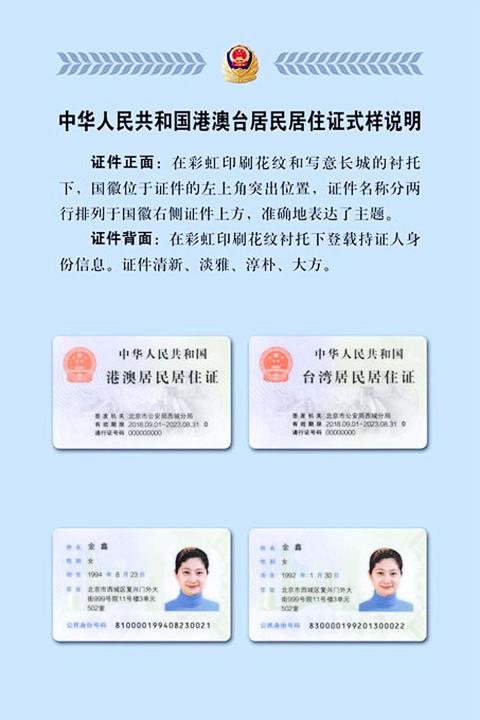Beijing is attempting to create the illusion that it has jurisdiction over Taiwan with its new residency permits for Taiwanese, a government official said yesterday on condition of anonymity.
With the cards, Beijing is attempting to make it seem as though some Taiwanese are governed by China, the official said, adding that Beijing is attempting to “govern Taiwan prior to unification” and to implement the “one country, two systems” principle in advance.
The Chinese State Council Information Office on Aug. 16 announced that from this month, Taiwanese, Hong Kongers and Macanese who have lived, worked or studied legally in China for more than six months would be eligible to apply for the cards, although reports have said that applicants who present proof of residence or employment, or are married to Chinese, could apply regardless of their time in China.

Photo: CNA
China’s Taiwan Affairs Office (TAO) at a routine news conference did not deny the reports, saying that local agencies would treat applicants on a case-by-case basis and try to meet the needs of applicants.
The office on Sept. 11 said that as of Sept. 10, more than 22,000 Taiwanese had applied for the cards.
On Wednesday, it said the cards are popular among Taiwanese in China, but did not give an updated number of how many had applied.
The Mainland Affairs Council said the government needs to block the political intention behind the cards.
To effectively counter China’s “united front” tactics and to lower the risk the cards pose to national security, the government must continue with security measures, such as registering people who have the cards, the council said.
The residency permits pose risks not only to personal data, but also national security, the anonymous government official said yesterday.
China has pressed international organizations to recognize “Taiwan compatriot travel documents” — permits issued to Taiwanese by Chinese authorities for travel to China — and limit the use of Republic of China (ROC) passports to weaken the passports’ power, the official said.
China might make the residency permits more powerful, such as by allowing holders to apply for Chinese passports or replacing ROC passports with them, the official said.
Yang Weimin (楊偉民), deputy director of the Chinese People’s Political Consultative Conference’s Committee for Economic Affairs, said possible reform of the Chinese household registration system might combine household registration with the residency card and the Chinese national identification card.
Beijing might also combine “Taiwan compatriot travel documents” with the residency card and the national ID card, managing the information as part of its household registration system, the Taiwanese official said, adding that developments need to be closely monitored.

‘ABUSE OF POWER’: Lee Chun-yi allegedly used a Control Yuan vehicle to transport his dog to a pet grooming salon and take his wife to restaurants, media reports said Control Yuan Secretary-General Lee Chun-yi (李俊俋) resigned on Sunday night, admitting that he had misused a government vehicle, as reported by the media. Control Yuan Vice President Lee Hung-chun (李鴻鈞) yesterday apologized to the public over the issue. The watchdog body would follow up on similar accusations made by the Chinese Nationalist Party (KMT) and would investigate the alleged misuse of government vehicles by three other Control Yuan members: Su Li-chiung (蘇麗瓊), Lin Yu-jung (林郁容) and Wang Jung-chang (王榮璋), Lee Hung-chun said. Lee Chun-yi in a statement apologized for using a Control Yuan vehicle to transport his dog to a

INDO-PACIFIC REGION: Royal Navy ships exercise the right of freedom of navigation, including in the Taiwan Strait and South China Sea, the UK’s Tony Radakin told a summit Freedom of navigation in the Indo-Pacific region is as important as it is in the English Channel, British Chief of the Defence Staff Admiral Tony Radakin said at a summit in Singapore on Saturday. The remark came as the British Royal Navy’s flagship aircraft carrier, the HMS Prince of Wales, is on an eight-month deployment to the Indo-Pacific region as head of an international carrier strike group. “Upholding the UN Convention on the Law of the Sea, and with it, the principles of the freedom of navigation, in this part of the world matters to us just as it matters in the

Taiwan yesterday denied Chinese allegations that its military was behind a cyberattack on a technology company in Guangzhou, after city authorities issued warrants for 20 suspects. The Guangzhou Municipal Public Security Bureau earlier yesterday issued warrants for 20 people it identified as members of the Information, Communications and Electronic Force Command (ICEFCOM). The bureau alleged they were behind a May 20 cyberattack targeting the backend system of a self-service facility at the company. “ICEFCOM, under Taiwan’s ruling Democratic Progressive Party, directed the illegal attack,” the warrant says. The bureau placed a bounty of 10,000 yuan (US$1,392) on each of the 20 people named in

The High Court yesterday found a New Taipei City woman guilty of charges related to helping Beijing secure surrender agreements from military service members. Lee Huei-hsin (李慧馨) was sentenced to six years and eight months in prison for breaching the National Security Act (國家安全法), making illegal compacts with government employees and bribery, the court said. The verdict is final. Lee, the manager of a temple in the city’s Lujhou District (蘆洲), was accused of arranging for eight service members to make surrender pledges to the Chinese People’s Liberation Army in exchange for money, the court said. The pledges, which required them to provide identification